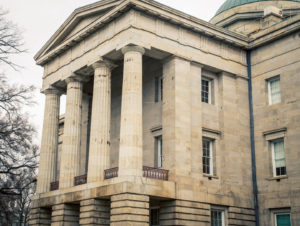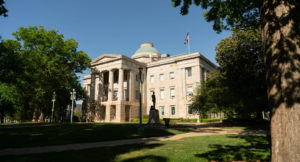Lawsuit to test North Carolina school choice vouchers – and religious schools’ ability to admit students according to their faith
Must religious schools be forced to admit those of other faiths if the students use tax-supported vouchers?
That’s the question in a lawsuit by seven parents claiming the North Carolina school…

Must religious schools be forced to admit those of other faiths if the students use tax-supported vouchers?
That’s the question in a lawsuit by seven parents claiming the North Carolina school choice program impermissibly allows religious schools to ban students of other faiths.
A three-judge panel will now rule in the case.
The state’s Opportunity Scholarship Program provides funding that enables students to attend private schools in lieu of underperforming public schools. According to a report by WRAL-TV in Raleigh, about 20,000 students use the program in attending around 500 schools.
The lawsuit was filed in 2020 by seven parents, including North Carolina Association of Educators President Tamika Walker-Kelly. One concern is that the program “as implemented violates the rights of some families who cannot use a private school voucher at Christian schools because they are members of other faiths,” according to WRAL.
However, none of the lawsuit’s parents had officially applied for the voucher program at any Christian schools.
The lawsuit alleges the program:
“1) fund[s] educational opportunities that are conditioned on the Plaintiffs’ and their family members’ religious faiths and sexual orientations, 2) creat[es] a program in which a student’s choice of schools is limited by his or her religious faith,” and “3) fund[s] schools that condition enrollment on the adoption of religious beliefs condemning homosexuality,” according to the October 18, 2022 opinion from the North Carolina Court of Appeals.
The Court of Appeals analyzed whether the claims brought by the parents amounted to a “facial challenge” to the Opportunity Scholarship Program, or an “as-applied” challenge. An “as-applied” challenge merely looks at the impact a statute has on specific plaintiffs, whereas a facial challenge calls into question the constitutionality of a statute itself, requiring a review from a panel of three judges.
The parents claimed that their complaint only constitutes an as-applied challenge that a single judge could decide. But a three-judge panel of the Court of Appeals recently ruled the complaint is a facial challenge to the Opportunity Scholarship Program, one that threatens its very existence and must be ruled on by a three-judge panel in the lower court.
Judge April Wood, who wrote the majority opinion, said the parents’ proposed relief “would effectively invalidate the Program in its entirety.”
Judge Richard Dietz agreed with Wood, while Judge Toby Hampson dissented. The Carolina Journal noted that Hampson is a Democrat, and that the other two are Republicans. Hampson argued that the decision “forces Plaintiffs to make a facial constitutional challenge Plaintiffs have not plead and expressly disavow.”
The case will now be heard by a panel of three judges of the Superior Court of Wake County.


